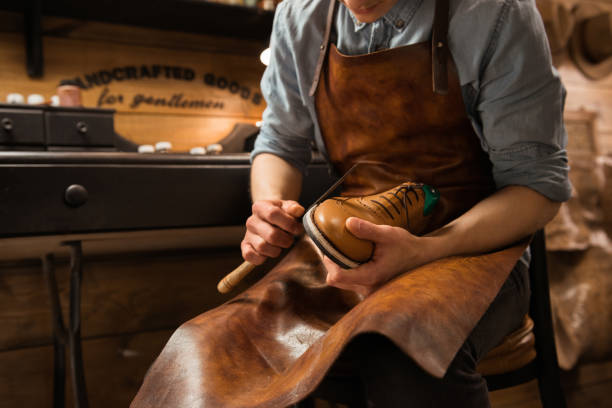Shoe cobblers, shoemakers, or shoe repairers are skilled professionals who repair, modify, and craft shoes. Are you wondering how to become a shoe cobbler in 2023? This article is for you.
While the demand for shoe cobblers has decreased with the rise of mass-produced shoes, there is still a need for skilled cobblers who can provide high-quality repairs and custom-made shoes.
This article will explore the skills and opportunities required to become a shoe cobbler in 2023. We will examine the required education and training, skills, and potential job opportunities for aspiring cobblers.
Whether you’re interested in starting your shoe repair business or working for an established cobbler, this article will provide valuable insights into shoe cobbling.

Table of contents
- Who is a Shoe Cobbler?
- How Do I Become A Shoe Cobbler- Step By Step Guide
- What are the skills required to become a shoe cobbler?
- What is the Salary Outlook of a Shoe Cobbler?
- What are the job prospects like for shoe cobblers?
- What are some standard tools and equipment used by shoe cobblers?
- What kind of training or education is needed to become a shoe cobbler?
- Are there any apprenticeship programs available for aspiring shoe cobblers?
- What are some of the challenges facing shoe cobblers?
- Is becoming a shoe cobbler worth it?
- Frequently Asked Questions
- Conclusion
- References
- Recommendations
Who is a Shoe Cobbler?
A shoe cobbler is a skilled artisan who repairs, restores, and modifies footwear, often using traditional techniques and tools.
Cobblers are experts in repairing shoes, boots, sandals, and other types of footwear, and they are often skilled in a wide range of techniques, such as sewing, stitching, gluing, and cutting. In addition to repairing shoes, cobblers may create custom footwear or modify existing shoes to fit a customers needs better.
Cobblers may work in shoe repair shops, factories, retail stores, or as independent contractors.
You should see this related article: What does an Electric Filter do? (Full explanation with FAQs)
How Do I Become A Shoe Cobbler- Step By Step Guide
If you’re interested in becoming a shoe cobbler, here’s a step-by-step guide to help you get started:
Step 1- Research the profession
Learn about the job duties, required skills, and job outlook for shoe cobblers. Talk to people who work in the industry and read articles and books on the subject.
Step 2- Develop your skills
To become a shoe cobbler, you must develop hand-eye coordination, attention to detail, physical agility, problem-solving, and customer service skills. Consider taking classes or courses on shoe repair, sewing, and leatherwork.
Read this article: What Does a Chief Cook Do? Full Explanations with FAQs.
Step 3- Gain experience
Look for opportunities to gain experiences in the field, such as apprenticeships or internships at shoe repair shops or factories. Alternatively, consider volunteering your services to local organizations or individuals to gain experience.
Step 4- Get the necessary tools and equipment
Invest in high-quality tools and equipment such as sewing machines, knives, scissors, awls, hammers, glue guns, and sanders. Additionally, you may need to purchase materials such as leather, thread, and adhesives.
Have you seen this article: What Is ESOL In Education? (Full Explanation With Faqs)
Step 5- Start your own business or look for employment
Consider starting your own shoe repair business, or look for employment at shoe repair shops, factories, or retail stores. Be prepared to market your skills and services to potential customers or employers.
Step 6- Continue learning and improving
As you gain experience, continue to learn and improve your skills. Stay up-to-date on new technologies and techniques in the field and seek opportunities to further your education.
Becoming a shoe cobbler requires skills, experience, and dedication. With persistence and hard work, you can become a skilled cobbler and make a career in this rewarding profession.
Check out this article: What Are the Different Types of Executive-Level Jobs in 2023? How to Apply.
What are the skills required to become a shoe cobbler?
To become a shoe cobbler, you’ll need to develop several skills, including:
- Hand-eye coordination: As a shoe cobbler, you’ll need to work with small parts and tools, requiring good hand-eye coordination.
- Attention to detail: A shoe cobbler must be able to identify and fix minor problems with shoes, such as loose stitching or worn soles.
- Physical dexterity: The job of a shoe cobbler requires good physical skill and the ability to work with your hands for extended periods.
- Problem-solving abilities: A shoe cobbler must be able to identify problems with shoes and determine the best course of action to repair them.
- Customer service skills: Shoe cobblers often work directly with customers, so good customer service skills are essential to building a loyal customer base.
- Technical skills: A shoe cobbler must be skilled in using tools and equipment such as sewing machines, knives, scissors, awls, hammers, glue guns, and sanders.
- Knowledge of materials and techniques: Cobblers must know different materials used in shoe repairs, such as leather, suede, and rubber. They should also be familiar with various techniques used in shoe repair, such as stitching, gluing, and stretching.
By developing these skills, you can become a successful shoe cobbler and offer high-quality repair services to your customers.
Check out this article: What is Intervention in Education (Full Explanation with FAQs)
What is the Salary Outlook of a Shoe Cobbler?
The salary outlook for a shoe cobbler can vary depending on several factors, such as experience, location, and the type of employment. According to data from the US Bureau of Labor Statistics, as of May 2020, the median annual wage for shoe and leather workers, including cobblers, was $28,680.
However, the salary range for shoe cobblers can vary widely. Cobblers who own their businesses may earn more, but their income can be unpredictable and fluctuate based on the service demand. Additionally, cobblers who work for large shoe repair companies or manufacturers may have a more stable income and benefits such as health insurance and retirement plans.
It’s important to note that becoming a shoe cobbler can be a rewarding career, even if the salary is lower than some other professions. Many cobblers enjoy repairing and restoring shoes, working with their hands, and connecting with customers.
Read this article: What Is Seminary School? Why I will prefer Seminary School.
What are the job prospects like for shoe cobblers?
The job prospects for shoe cobblers can vary depending on location and the overall demand for shoe repair services.
In recent years, there has been a decline in shoe repair shops due to factors such as the rise of fast fashion and the availability of cheaper, disposable footwear. However, there is still a demand for high-quality shoe repair services, particularly among people who prefer to keep their shoes in good condition or have high-end footwear.
Shoe cobblers may also have opportunities to work for shoe manufacturers or retailers, providing repair and maintenance services for their customers.
The job prospects for shoe cobblers may be limited, but skilled professionals still need to provide high-quality repair services. With the rise of sustainability and the desire for high-quality, long-lasting products, there may be an increasing demand for shoe repair services.
You should see this article: What is the Hardest Year of High School? How to Scale Through.
What are some standard tools and equipment used by shoe cobblers?
Shoe cobblers use various tools and equipment to repair and restore shoes. Some standard tools and equipment used by shoe cobblers include:
- Sewing machines: Shoe cobblers use industrial-grade sewing machines to stitch and improve shoes.
- Knives and scissors: Sharp knives are essential for cutting and shaping leather and other materials.
- Hammers and mallets: Cobblers use hammers and mallets to punch holes, flatten seams, and shape materials.
- Awls and punches: Awls and punches are used to make holes and stitch patterns in leather.
- Sandpaper and sanders: Sandpaper and sanders are used to smooth and shape leather and other materials.
- Lasts: Lasts are wooden or plastic forms that are used to shape shoes during repair and construction.
- Adhesives and glues: Cobblers use various adhesives and sealants to repair shoes, including contact and rubber cement.
- Dyes and polishes: Shoe cobblers use dyes and polishes to color and shine shoes, giving them a finished look.
Using these tools and equipment, shoe cobblers can provide high-quality repair services and restore shoes to their original condition.
Read this article: What is a Quaker School? (Full Explanation with FAQs)
What kind of training or education is needed to become a shoe cobbler?
There is no specific education or training required to become a shoe cobbler. However, gaining knowledge and skills in shoe repair through training or apprenticeships is beneficial.
One way to learn the craft of shoe repair is through on-the-job training. Many cobblers start working in a shoe repair shop as apprentices, where they learn the skills needed to repair shoes from experienced cobblers.
Alternatively, there are trade schools that offer courses in shoe repair, where students can learn the basics of shoe construction, repair techniques, and how to use the tools and equipment needed for the job. These programs may offer certificates or diplomas upon completion.
There are also online resources and instructional videos available that can teach the basics of shoe repair. While these resources may not provide hands-on training, they can be a useful starting point for learning about shoe repair techniques and processes.
Becoming a skilled shoe cobbler requires time, practice, and commitment to learning and developing the necessary skills.
Have you seen this article: What Is ESOL In Education? (Full Explanation With Faqs)
Are there any apprenticeship programs available for aspiring shoe cobblers?
Yes, there are apprenticeship programs available for aspiring shoe cobblers. Apprenticeships can be a great way to gain hands-on experience and learn the skills needed to become a skilled cobbler.
In the United States, various organizations offer apprenticeship programs for shoe cobblers. For example, the Shoe Service Institute of America (SSIA) provides a comprehensive apprenticeship program that includes classroom instruction and on-the-job training. The program typically lasts two years and covers many topics, including shoe construction, repair techniques, and business management.
Some shoe repair shops may also offer apprenticeships or internships to aspiring cobblers. These programs may provide more specialized training and focus on the shop’s specific needs.
Apprenticeship programs can be a valuable way to gain the skills and experience needed to become a successful shoe cobbler. By learning from experienced cobblers, apprentices can develop the necessary knowledge and expertise to repair and restore shoes to their original condition.
Check out this article: What is Intervention in Education (Full Explanation with FAQs)
What are some of the challenges facing shoe cobblers?
Shoe cobblers face several challenges in their profession, including:
Decline in demand
With the rise of fast fashion and disposable footwear, there has been a decline in the demand for shoe repair services. This can make it difficult for cobblers to find work and stay in business.
Competition from cheap imports
Many low-priced shoes are now manufactured overseas and imported into the United States, making it difficult for cobblers to compete on price.
Read this article: What Is Seminary School? Why I will prefer Seminary School.
Cost of materials
High-quality materials, such as leather, can be expensive, making it challenging for cobblers to keep their prices competitive.
Difficulty finding skilled workers
As the demand for shoe repair services has declined, finding skilled workers to train as cobblers have become more challenging.
Technological advances
Some new footwear materials, such as synthetics and plastics, can be more challenging to repair than traditional materials like leather. Cobblers must stay up-to-date on new materials and repair techniques to remain competitive.
You should see this article: What is the Hardest Year of High School? How to Scale Through.
Health risks
Shoe cobblers expose themselves to harmful chemicals, such as adhesives and solvents, which can pose health risks if improperly handled. Cobblers must take appropriate safety precautions to protect themselves from these risks.
Despite these challenges, shoe cobblers continue to provide valuable services to those who value high-quality, long-lasting footwear. By adapting to changing market conditions and continuing to develop their skills, cobblers can continue to thrive in their profession.
Have you seen this article: What is a Quaker School? (Full Explanation with FAQs)
Is becoming a shoe cobbler worth it?
Whether becoming a shoe cobbler is worth it depends on several factors, including personal interests, job satisfaction, and income potential. Here are some points to consider:
Pros:
- Job satisfaction: Many shoe cobblers find their work rewarding, as they get to work with their hands and see the tangible results of their efforts.
- Autonomy: Shoe cobblers often work independently or in small shops, providing a sense of independence and control over one’s work.
- Income potential: While the income potential for shoe cobblers may not be as high as some other professions, some cobblers can earn a comfortable living through their work.
Cons:
- Physical demands: Shoe cobblers may spend long hours on their feet and performing repetitive tasks, which can be physically demanding.
- Income variability: Income as a shoe cobbler can be variable, as demand for shoe repair services can fluctuate based on economic conditions and fashion trends.
- Limited career growth: There may be limited opportunities for career growth in shoe repair, as many cobblers work independently or in small shops.
Becoming a shoe cobbler can be a worthwhile pursuit for those passionate about working with their hands and providing high-quality shoe repair services. However, some may have better career choices, and potential cobblers should carefully consider the pros and cons before pursuing this career path.
Check out this article: LNAT Universities 2023| Universities that Require an LNAT
Frequently Asked Questions
To become a shoe cobbler in 2023, you will need hand-eye coordination, attention to detail, physical agility, problem-solving abilities, and customer service skills. Additionally, having some knowledge of different materials and techniques used in shoe repair can be beneficial.
While a formal education is not required, completing a vocational training program or apprenticeship to learn the skills necessary to become a shoe cobbler can be beneficial. Many cobblers start by learning on the job as apprentices, but some technical schools and colleges also offer programs in shoe repair.
Shoe cobblers can work in various settings, such as shoe repair shops, retail stores, and factories. Additionally, some cobblers choose to start their businesses and work as independent contractors. With the rise of e-commerce, there may also be opportunities for cobblers to offer online repair services.
The salary of a shoe cobbler can vary based on factors such as location, experience, and the type of work they perform. According to the Bureau of Labor Statistics, the median annual wage for shoemakers and repairers was $29,270 in May 2020.
Some standard tools and equipment used by shoe cobblers in 2023 include sewing machines, knives, scissors, awls, hammers, glue guns, and sanders. Additionally, cobblers may use specialized equipment for tasks such as stretching shoes or repairing zippers.
Conclusion
Becoming a shoe cobbler in 2023 requires education, training, and hands-on experience. While the demand for shoe cobblers has decreased with the rise of mass-produced shoes, there is still a need for skilled professionals who can provide high-quality repairs and custom-made shoes.
Aspiring cobblers should focus on developing skills in areas such as leatherworking, stitching, and patternmaking and staying up-to-date with the latest technologies and materials used in shoe repair.
Becoming a shoe cobbler in 2023 can be fulfilling and rewarding with the right skills and knowledge.
Read this article: What is Enrichment in School? (Full Explanation with FAQs)
References
- https://nationalcareers.service.gov.uk.
- https://www.practicaladultinsights.com/how-do-i-become-a-shoe-cobbler.htm
- https://www.quora.com/How-do-you-become-a-shoe-cobbler

